Report on Higher Education Skills and Competencies Development
VerifiedAdded on 2023/02/03
|9
|2066
|51
Report
AI Summary
This report provides a comprehensive analysis of the skills and competencies developed by a student in higher education. The report begins by differentiating between learning in a school environment and higher education, highlighting the increased freedom and self-management required in college. It then delves into the development of critical reading and thinking skills, outlining strategies like previewing, predicting, summarization, questioning, and visualization. The report also discusses the ability to locate, collect, and record information using various academic resources, including search engines and secondary data sources, and emphasizes the importance of evaluating the reliability of information. Further, it explores reading skills and strategies for improvement, such as reciprocal teaching and time management, and concludes with a self-reflection on the student's progress and areas for future development. The appendices includes a time table for the study schedule.
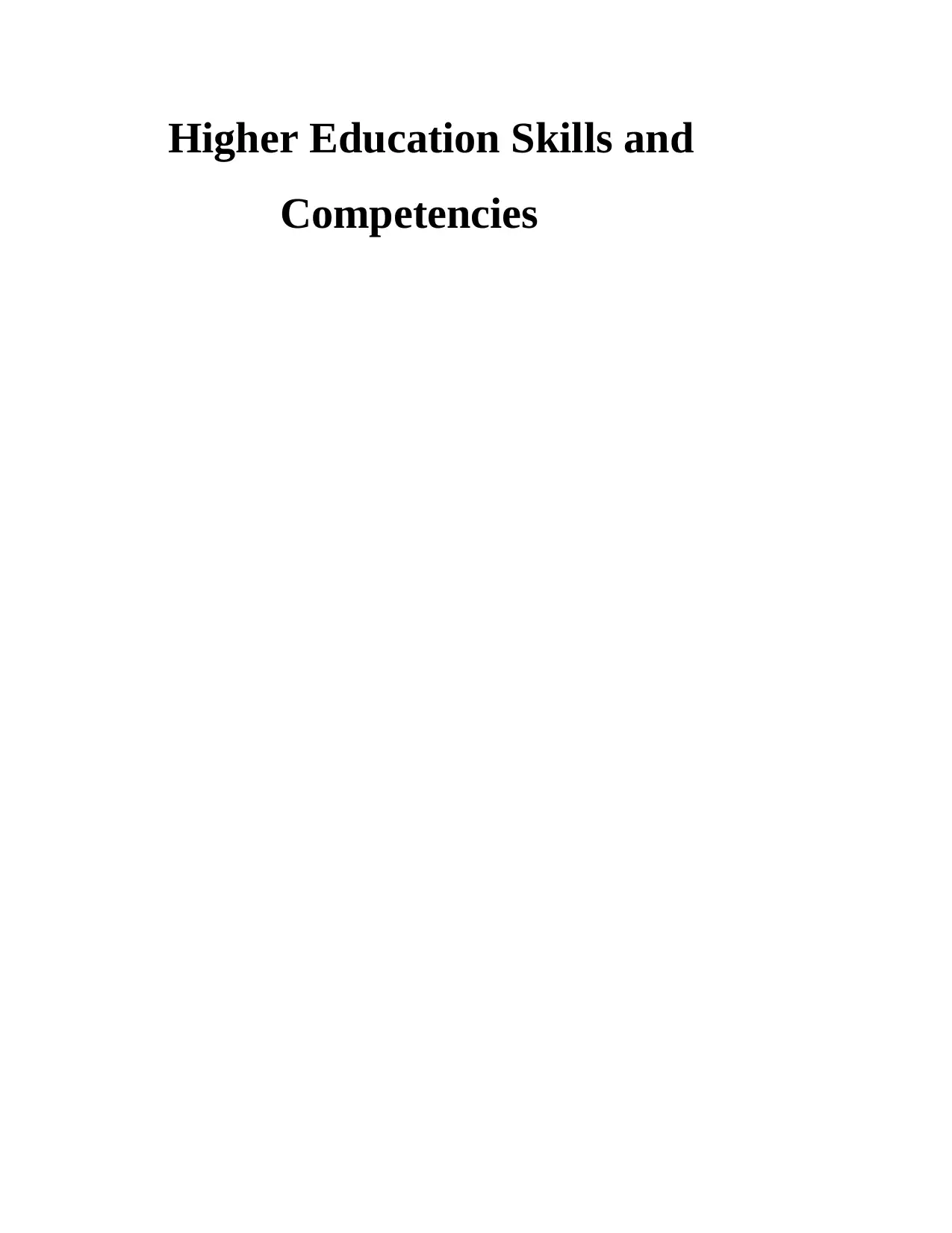
Higher Education Skills and
Competencies
Competencies
Paraphrase This Document
Need a fresh take? Get an instant paraphrase of this document with our AI Paraphraser
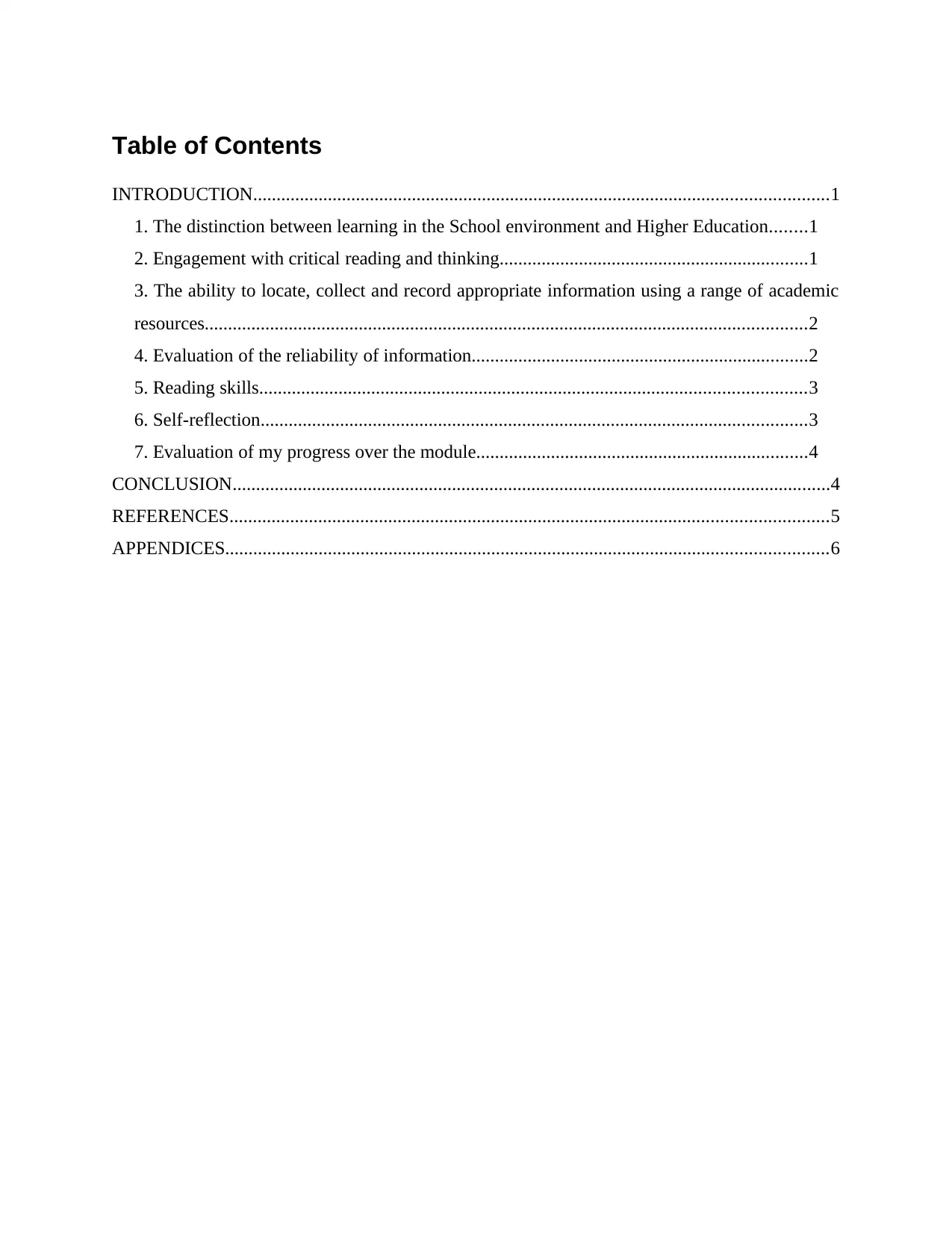
Table of Contents
INTRODUCTION...........................................................................................................................1
1. The distinction between learning in the School environment and Higher Education........1
2. Engagement with critical reading and thinking..................................................................1
3. The ability to locate, collect and record appropriate information using a range of academic
resources.................................................................................................................................2
4. Evaluation of the reliability of information........................................................................2
5. Reading skills.....................................................................................................................3
6. Self-reflection.....................................................................................................................3
7. Evaluation of my progress over the module.......................................................................4
CONCLUSION................................................................................................................................4
REFERENCES................................................................................................................................5
APPENDICES.................................................................................................................................6
INTRODUCTION...........................................................................................................................1
1. The distinction between learning in the School environment and Higher Education........1
2. Engagement with critical reading and thinking..................................................................1
3. The ability to locate, collect and record appropriate information using a range of academic
resources.................................................................................................................................2
4. Evaluation of the reliability of information........................................................................2
5. Reading skills.....................................................................................................................3
6. Self-reflection.....................................................................................................................3
7. Evaluation of my progress over the module.......................................................................4
CONCLUSION................................................................................................................................4
REFERENCES................................................................................................................................5
APPENDICES.................................................................................................................................6
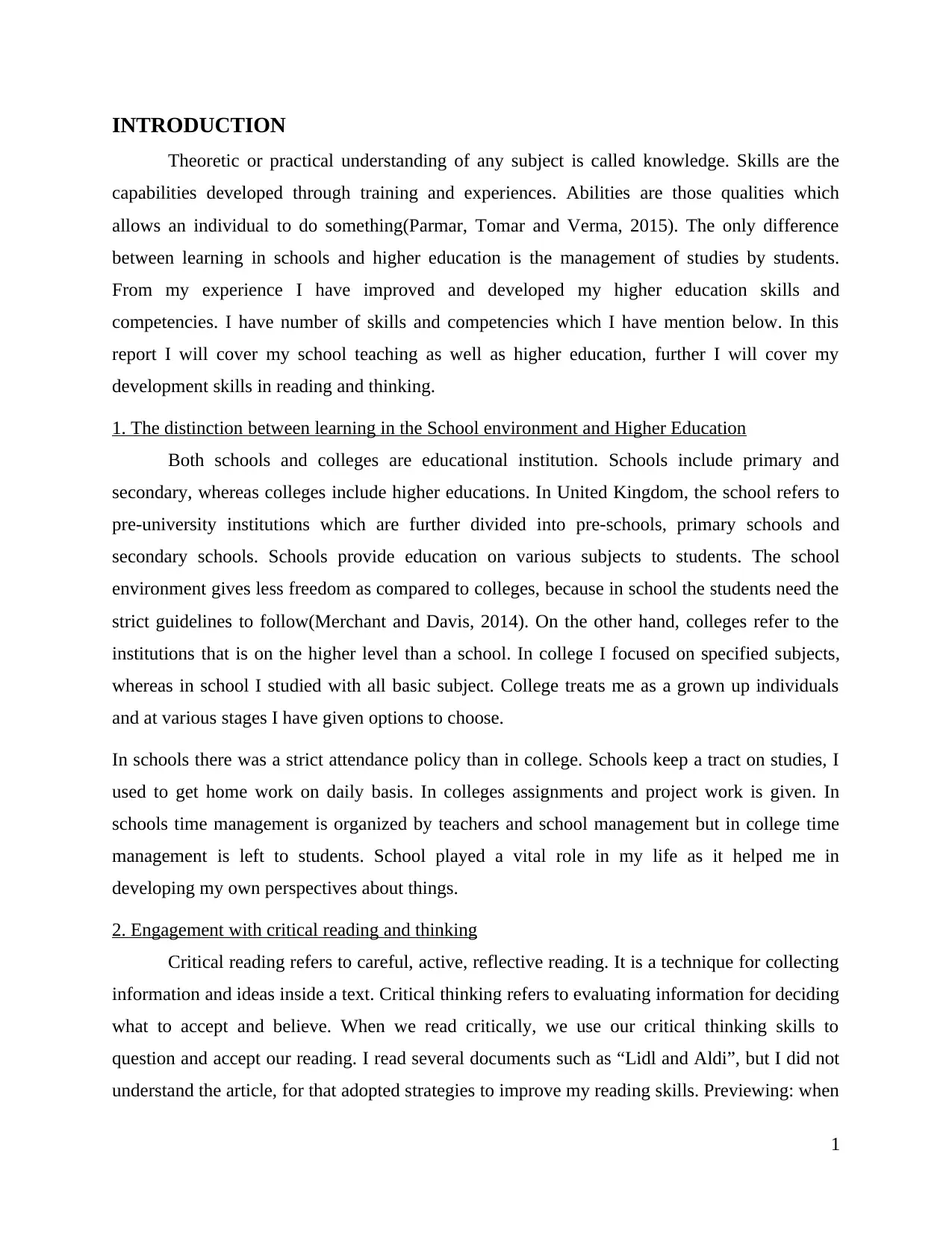
INTRODUCTION
Theoretic or practical understanding of any subject is called knowledge. Skills are the
capabilities developed through training and experiences. Abilities are those qualities which
allows an individual to do something(Parmar, Tomar and Verma, 2015). The only difference
between learning in schools and higher education is the management of studies by students.
From my experience I have improved and developed my higher education skills and
competencies. I have number of skills and competencies which I have mention below. In this
report I will cover my school teaching as well as higher education, further I will cover my
development skills in reading and thinking.
1. The distinction between learning in the School environment and Higher Education
Both schools and colleges are educational institution. Schools include primary and
secondary, whereas colleges include higher educations. In United Kingdom, the school refers to
pre-university institutions which are further divided into pre-schools, primary schools and
secondary schools. Schools provide education on various subjects to students. The school
environment gives less freedom as compared to colleges, because in school the students need the
strict guidelines to follow(Merchant and Davis, 2014). On the other hand, colleges refer to the
institutions that is on the higher level than a school. In college I focused on specified subjects,
whereas in school I studied with all basic subject. College treats me as a grown up individuals
and at various stages I have given options to choose.
In schools there was a strict attendance policy than in college. Schools keep a tract on studies, I
used to get home work on daily basis. In colleges assignments and project work is given. In
schools time management is organized by teachers and school management but in college time
management is left to students. School played a vital role in my life as it helped me in
developing my own perspectives about things.
2. Engagement with critical reading and thinking
Critical reading refers to careful, active, reflective reading. It is a technique for collecting
information and ideas inside a text. Critical thinking refers to evaluating information for deciding
what to accept and believe. When we read critically, we use our critical thinking skills to
question and accept our reading. I read several documents such as “Lidl and Aldi”, but I did not
understand the article, for that adopted strategies to improve my reading skills. Previewing: when
1
Theoretic or practical understanding of any subject is called knowledge. Skills are the
capabilities developed through training and experiences. Abilities are those qualities which
allows an individual to do something(Parmar, Tomar and Verma, 2015). The only difference
between learning in schools and higher education is the management of studies by students.
From my experience I have improved and developed my higher education skills and
competencies. I have number of skills and competencies which I have mention below. In this
report I will cover my school teaching as well as higher education, further I will cover my
development skills in reading and thinking.
1. The distinction between learning in the School environment and Higher Education
Both schools and colleges are educational institution. Schools include primary and
secondary, whereas colleges include higher educations. In United Kingdom, the school refers to
pre-university institutions which are further divided into pre-schools, primary schools and
secondary schools. Schools provide education on various subjects to students. The school
environment gives less freedom as compared to colleges, because in school the students need the
strict guidelines to follow(Merchant and Davis, 2014). On the other hand, colleges refer to the
institutions that is on the higher level than a school. In college I focused on specified subjects,
whereas in school I studied with all basic subject. College treats me as a grown up individuals
and at various stages I have given options to choose.
In schools there was a strict attendance policy than in college. Schools keep a tract on studies, I
used to get home work on daily basis. In colleges assignments and project work is given. In
schools time management is organized by teachers and school management but in college time
management is left to students. School played a vital role in my life as it helped me in
developing my own perspectives about things.
2. Engagement with critical reading and thinking
Critical reading refers to careful, active, reflective reading. It is a technique for collecting
information and ideas inside a text. Critical thinking refers to evaluating information for deciding
what to accept and believe. When we read critically, we use our critical thinking skills to
question and accept our reading. I read several documents such as “Lidl and Aldi”, but I did not
understand the article, for that adopted strategies to improve my reading skills. Previewing: when
1
⊘ This is a preview!⊘
Do you want full access?
Subscribe today to unlock all pages.

Trusted by 1+ million students worldwide
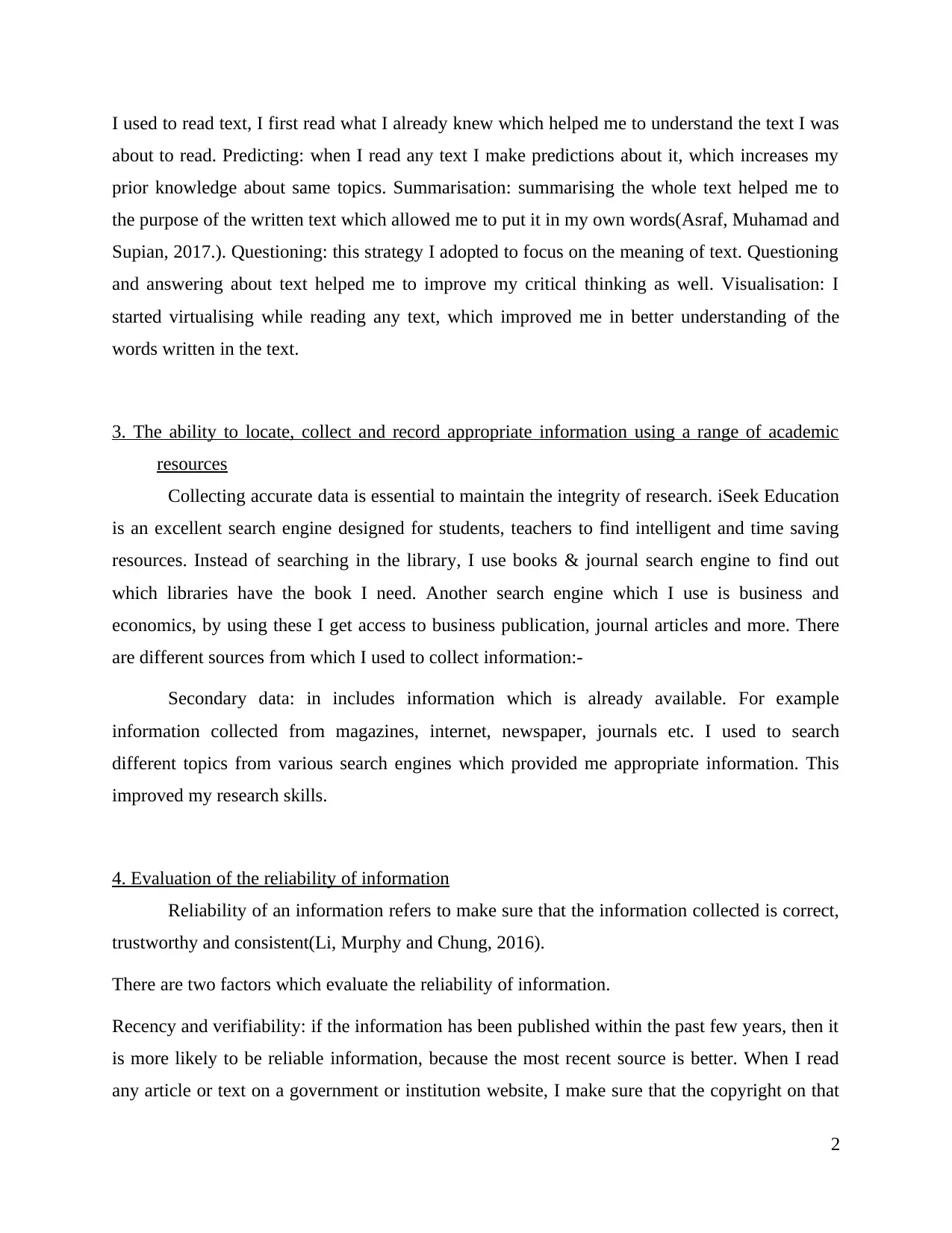
I used to read text, I first read what I already knew which helped me to understand the text I was
about to read. Predicting: when I read any text I make predictions about it, which increases my
prior knowledge about same topics. Summarisation: summarising the whole text helped me to
the purpose of the written text which allowed me to put it in my own words(Asraf, Muhamad and
Supian, 2017.). Questioning: this strategy I adopted to focus on the meaning of text. Questioning
and answering about text helped me to improve my critical thinking as well. Visualisation: I
started virtualising while reading any text, which improved me in better understanding of the
words written in the text.
3. The ability to locate, collect and record appropriate information using a range of academic
resources
Collecting accurate data is essential to maintain the integrity of research. iSeek Education
is an excellent search engine designed for students, teachers to find intelligent and time saving
resources. Instead of searching in the library, I use books & journal search engine to find out
which libraries have the book I need. Another search engine which I use is business and
economics, by using these I get access to business publication, journal articles and more. There
are different sources from which I used to collect information:-
Secondary data: in includes information which is already available. For example
information collected from magazines, internet, newspaper, journals etc. I used to search
different topics from various search engines which provided me appropriate information. This
improved my research skills.
4. Evaluation of the reliability of information
Reliability of an information refers to make sure that the information collected is correct,
trustworthy and consistent(Li, Murphy and Chung, 2016).
There are two factors which evaluate the reliability of information.
Recency and verifiability: if the information has been published within the past few years, then it
is more likely to be reliable information, because the most recent source is better. When I read
any article or text on a government or institution website, I make sure that the copyright on that
2
about to read. Predicting: when I read any text I make predictions about it, which increases my
prior knowledge about same topics. Summarisation: summarising the whole text helped me to
the purpose of the written text which allowed me to put it in my own words(Asraf, Muhamad and
Supian, 2017.). Questioning: this strategy I adopted to focus on the meaning of text. Questioning
and answering about text helped me to improve my critical thinking as well. Visualisation: I
started virtualising while reading any text, which improved me in better understanding of the
words written in the text.
3. The ability to locate, collect and record appropriate information using a range of academic
resources
Collecting accurate data is essential to maintain the integrity of research. iSeek Education
is an excellent search engine designed for students, teachers to find intelligent and time saving
resources. Instead of searching in the library, I use books & journal search engine to find out
which libraries have the book I need. Another search engine which I use is business and
economics, by using these I get access to business publication, journal articles and more. There
are different sources from which I used to collect information:-
Secondary data: in includes information which is already available. For example
information collected from magazines, internet, newspaper, journals etc. I used to search
different topics from various search engines which provided me appropriate information. This
improved my research skills.
4. Evaluation of the reliability of information
Reliability of an information refers to make sure that the information collected is correct,
trustworthy and consistent(Li, Murphy and Chung, 2016).
There are two factors which evaluate the reliability of information.
Recency and verifiability: if the information has been published within the past few years, then it
is more likely to be reliable information, because the most recent source is better. When I read
any article or text on a government or institution website, I make sure that the copyright on that
2
Paraphrase This Document
Need a fresh take? Get an instant paraphrase of this document with our AI Paraphraser
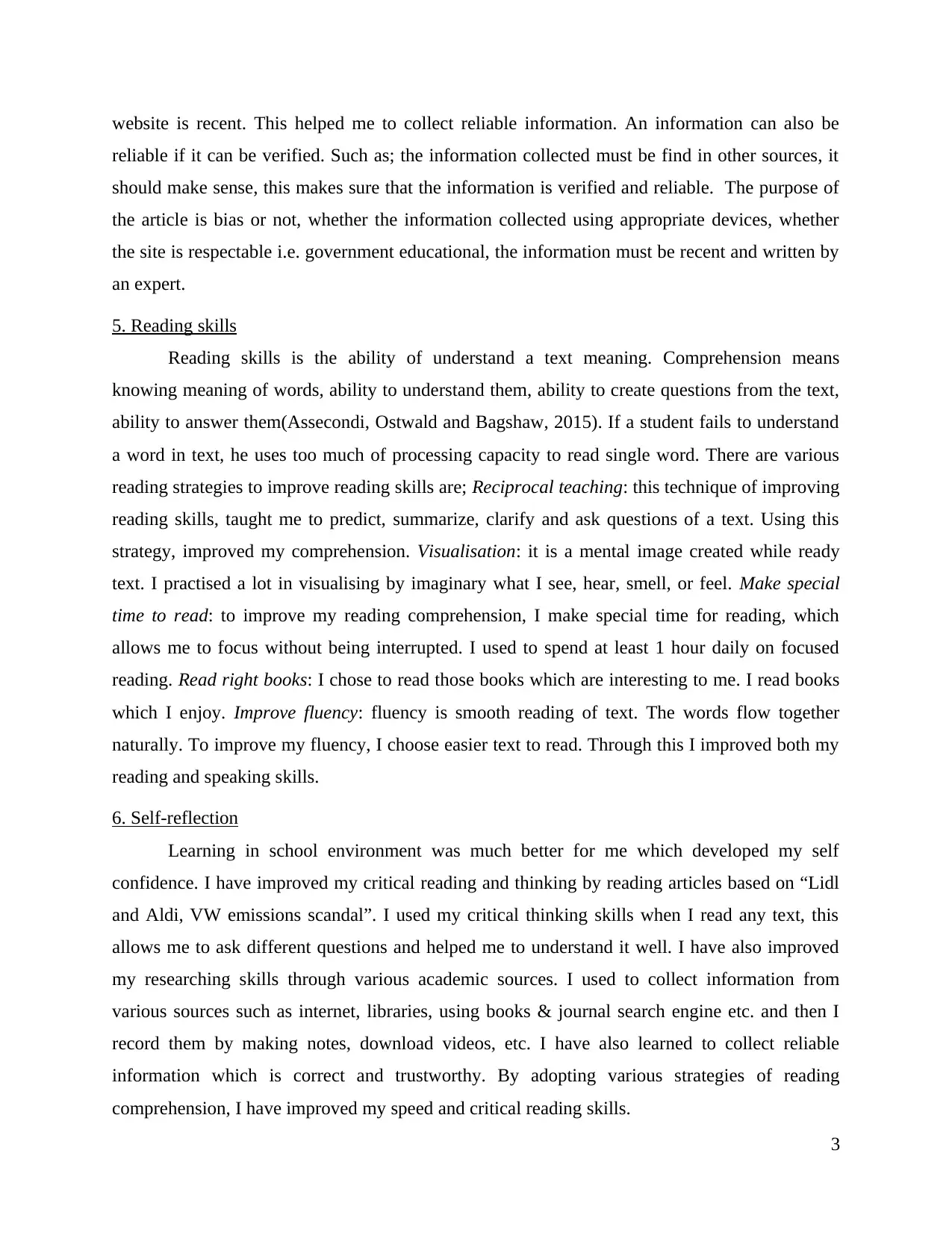
website is recent. This helped me to collect reliable information. An information can also be
reliable if it can be verified. Such as; the information collected must be find in other sources, it
should make sense, this makes sure that the information is verified and reliable. The purpose of
the article is bias or not, whether the information collected using appropriate devices, whether
the site is respectable i.e. government educational, the information must be recent and written by
an expert.
5. Reading skills
Reading skills is the ability of understand a text meaning. Comprehension means
knowing meaning of words, ability to understand them, ability to create questions from the text,
ability to answer them(Assecondi, Ostwald and Bagshaw, 2015). If a student fails to understand
a word in text, he uses too much of processing capacity to read single word. There are various
reading strategies to improve reading skills are; Reciprocal teaching: this technique of improving
reading skills, taught me to predict, summarize, clarify and ask questions of a text. Using this
strategy, improved my comprehension. Visualisation: it is a mental image created while ready
text. I practised a lot in visualising by imaginary what I see, hear, smell, or feel. Make special
time to read: to improve my reading comprehension, I make special time for reading, which
allows me to focus without being interrupted. I used to spend at least 1 hour daily on focused
reading. Read right books: I chose to read those books which are interesting to me. I read books
which I enjoy. Improve fluency: fluency is smooth reading of text. The words flow together
naturally. To improve my fluency, I choose easier text to read. Through this I improved both my
reading and speaking skills.
6. Self-reflection
Learning in school environment was much better for me which developed my self
confidence. I have improved my critical reading and thinking by reading articles based on “Lidl
and Aldi, VW emissions scandal”. I used my critical thinking skills when I read any text, this
allows me to ask different questions and helped me to understand it well. I have also improved
my researching skills through various academic sources. I used to collect information from
various sources such as internet, libraries, using books & journal search engine etc. and then I
record them by making notes, download videos, etc. I have also learned to collect reliable
information which is correct and trustworthy. By adopting various strategies of reading
comprehension, I have improved my speed and critical reading skills.
3
reliable if it can be verified. Such as; the information collected must be find in other sources, it
should make sense, this makes sure that the information is verified and reliable. The purpose of
the article is bias or not, whether the information collected using appropriate devices, whether
the site is respectable i.e. government educational, the information must be recent and written by
an expert.
5. Reading skills
Reading skills is the ability of understand a text meaning. Comprehension means
knowing meaning of words, ability to understand them, ability to create questions from the text,
ability to answer them(Assecondi, Ostwald and Bagshaw, 2015). If a student fails to understand
a word in text, he uses too much of processing capacity to read single word. There are various
reading strategies to improve reading skills are; Reciprocal teaching: this technique of improving
reading skills, taught me to predict, summarize, clarify and ask questions of a text. Using this
strategy, improved my comprehension. Visualisation: it is a mental image created while ready
text. I practised a lot in visualising by imaginary what I see, hear, smell, or feel. Make special
time to read: to improve my reading comprehension, I make special time for reading, which
allows me to focus without being interrupted. I used to spend at least 1 hour daily on focused
reading. Read right books: I chose to read those books which are interesting to me. I read books
which I enjoy. Improve fluency: fluency is smooth reading of text. The words flow together
naturally. To improve my fluency, I choose easier text to read. Through this I improved both my
reading and speaking skills.
6. Self-reflection
Learning in school environment was much better for me which developed my self
confidence. I have improved my critical reading and thinking by reading articles based on “Lidl
and Aldi, VW emissions scandal”. I used my critical thinking skills when I read any text, this
allows me to ask different questions and helped me to understand it well. I have also improved
my researching skills through various academic sources. I used to collect information from
various sources such as internet, libraries, using books & journal search engine etc. and then I
record them by making notes, download videos, etc. I have also learned to collect reliable
information which is correct and trustworthy. By adopting various strategies of reading
comprehension, I have improved my speed and critical reading skills.
3
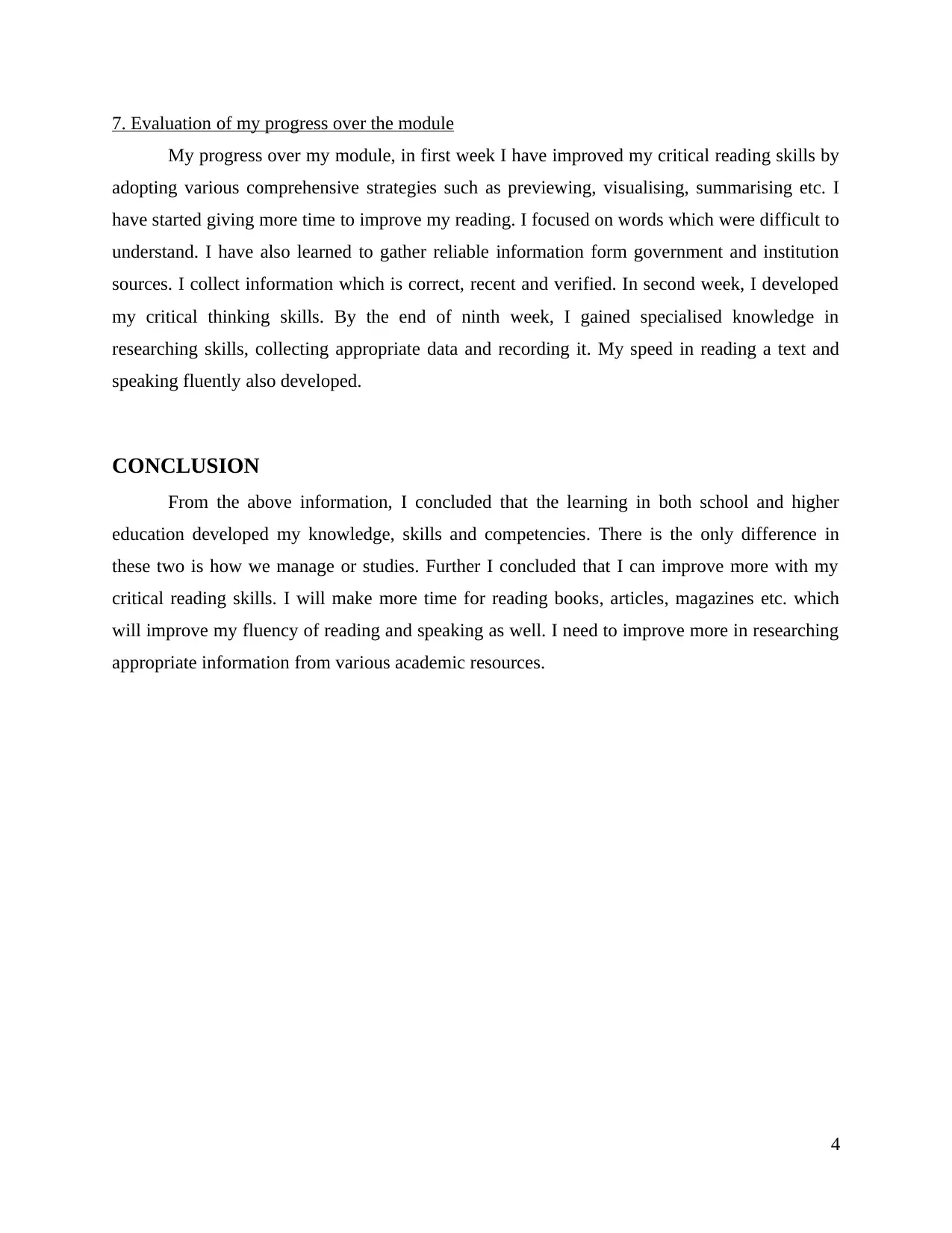
7. Evaluation of my progress over the module
My progress over my module, in first week I have improved my critical reading skills by
adopting various comprehensive strategies such as previewing, visualising, summarising etc. I
have started giving more time to improve my reading. I focused on words which were difficult to
understand. I have also learned to gather reliable information form government and institution
sources. I collect information which is correct, recent and verified. In second week, I developed
my critical thinking skills. By the end of ninth week, I gained specialised knowledge in
researching skills, collecting appropriate data and recording it. My speed in reading a text and
speaking fluently also developed.
CONCLUSION
From the above information, I concluded that the learning in both school and higher
education developed my knowledge, skills and competencies. There is the only difference in
these two is how we manage or studies. Further I concluded that I can improve more with my
critical reading skills. I will make more time for reading books, articles, magazines etc. which
will improve my fluency of reading and speaking as well. I need to improve more in researching
appropriate information from various academic resources.
4
My progress over my module, in first week I have improved my critical reading skills by
adopting various comprehensive strategies such as previewing, visualising, summarising etc. I
have started giving more time to improve my reading. I focused on words which were difficult to
understand. I have also learned to gather reliable information form government and institution
sources. I collect information which is correct, recent and verified. In second week, I developed
my critical thinking skills. By the end of ninth week, I gained specialised knowledge in
researching skills, collecting appropriate data and recording it. My speed in reading a text and
speaking fluently also developed.
CONCLUSION
From the above information, I concluded that the learning in both school and higher
education developed my knowledge, skills and competencies. There is the only difference in
these two is how we manage or studies. Further I concluded that I can improve more with my
critical reading skills. I will make more time for reading books, articles, magazines etc. which
will improve my fluency of reading and speaking as well. I need to improve more in researching
appropriate information from various academic resources.
4
⊘ This is a preview!⊘
Do you want full access?
Subscribe today to unlock all pages.

Trusted by 1+ million students worldwide
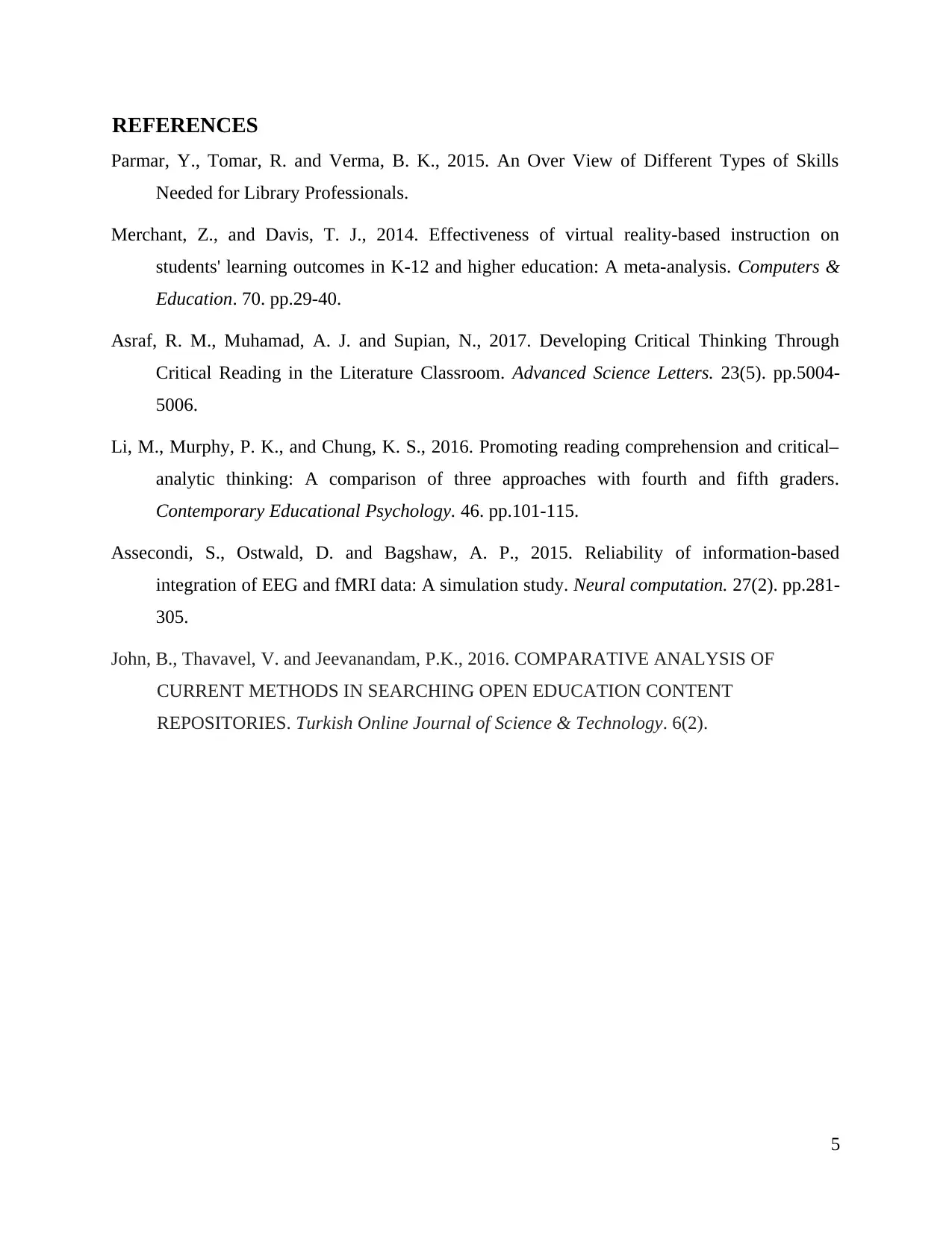
REFERENCES
Parmar, Y., Tomar, R. and Verma, B. K., 2015. An Over View of Different Types of Skills
Needed for Library Professionals.
Merchant, Z., and Davis, T. J., 2014. Effectiveness of virtual reality-based instruction on
students' learning outcomes in K-12 and higher education: A meta-analysis. Computers &
Education. 70. pp.29-40.
Asraf, R. M., Muhamad, A. J. and Supian, N., 2017. Developing Critical Thinking Through
Critical Reading in the Literature Classroom. Advanced Science Letters. 23(5). pp.5004-
5006.
Li, M., Murphy, P. K., and Chung, K. S., 2016. Promoting reading comprehension and critical–
analytic thinking: A comparison of three approaches with fourth and fifth graders.
Contemporary Educational Psychology. 46. pp.101-115.
Assecondi, S., Ostwald, D. and Bagshaw, A. P., 2015. Reliability of information-based
integration of EEG and fMRI data: A simulation study. Neural computation. 27(2). pp.281-
305.
John, B., Thavavel, V. and Jeevanandam, P.K., 2016. COMPARATIVE ANALYSIS OF
CURRENT METHODS IN SEARCHING OPEN EDUCATION CONTENT
REPOSITORIES. Turkish Online Journal of Science & Technology. 6(2).
5
Parmar, Y., Tomar, R. and Verma, B. K., 2015. An Over View of Different Types of Skills
Needed for Library Professionals.
Merchant, Z., and Davis, T. J., 2014. Effectiveness of virtual reality-based instruction on
students' learning outcomes in K-12 and higher education: A meta-analysis. Computers &
Education. 70. pp.29-40.
Asraf, R. M., Muhamad, A. J. and Supian, N., 2017. Developing Critical Thinking Through
Critical Reading in the Literature Classroom. Advanced Science Letters. 23(5). pp.5004-
5006.
Li, M., Murphy, P. K., and Chung, K. S., 2016. Promoting reading comprehension and critical–
analytic thinking: A comparison of three approaches with fourth and fifth graders.
Contemporary Educational Psychology. 46. pp.101-115.
Assecondi, S., Ostwald, D. and Bagshaw, A. P., 2015. Reliability of information-based
integration of EEG and fMRI data: A simulation study. Neural computation. 27(2). pp.281-
305.
John, B., Thavavel, V. and Jeevanandam, P.K., 2016. COMPARATIVE ANALYSIS OF
CURRENT METHODS IN SEARCHING OPEN EDUCATION CONTENT
REPOSITORIES. Turkish Online Journal of Science & Technology. 6(2).
5
Paraphrase This Document
Need a fresh take? Get an instant paraphrase of this document with our AI Paraphraser
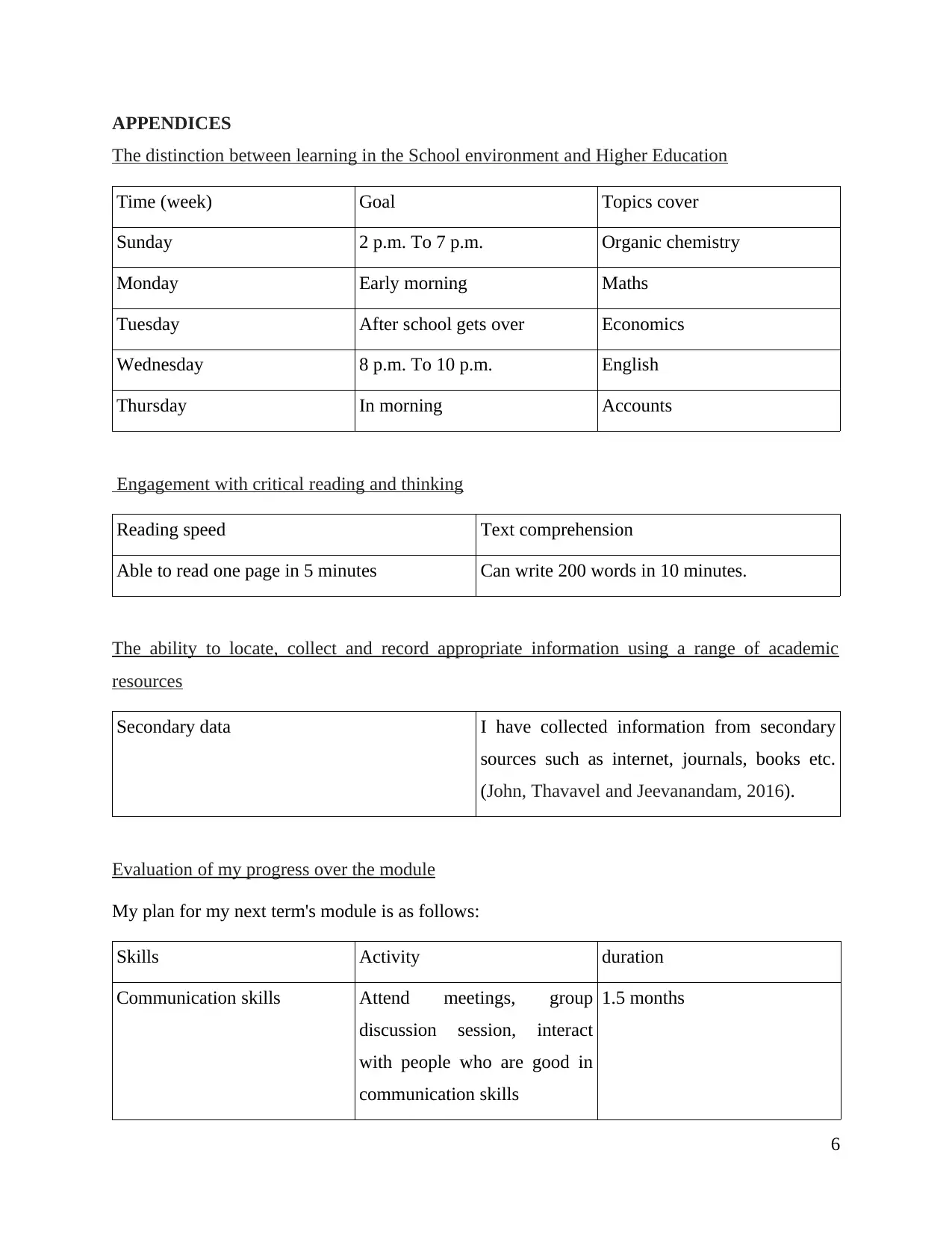
APPENDICES
The distinction between learning in the School environment and Higher Education
Time (week) Goal Topics cover
Sunday 2 p.m. To 7 p.m. Organic chemistry
Monday Early morning Maths
Tuesday After school gets over Economics
Wednesday 8 p.m. To 10 p.m. English
Thursday In morning Accounts
Engagement with critical reading and thinking
Reading speed Text comprehension
Able to read one page in 5 minutes Can write 200 words in 10 minutes.
The ability to locate, collect and record appropriate information using a range of academic
resources
Secondary data I have collected information from secondary
sources such as internet, journals, books etc.
(John, Thavavel and Jeevanandam, 2016).
Evaluation of my progress over the module
My plan for my next term's module is as follows:
Skills Activity duration
Communication skills Attend meetings, group
discussion session, interact
with people who are good in
communication skills
1.5 months
6
The distinction between learning in the School environment and Higher Education
Time (week) Goal Topics cover
Sunday 2 p.m. To 7 p.m. Organic chemistry
Monday Early morning Maths
Tuesday After school gets over Economics
Wednesday 8 p.m. To 10 p.m. English
Thursday In morning Accounts
Engagement with critical reading and thinking
Reading speed Text comprehension
Able to read one page in 5 minutes Can write 200 words in 10 minutes.
The ability to locate, collect and record appropriate information using a range of academic
resources
Secondary data I have collected information from secondary
sources such as internet, journals, books etc.
(John, Thavavel and Jeevanandam, 2016).
Evaluation of my progress over the module
My plan for my next term's module is as follows:
Skills Activity duration
Communication skills Attend meetings, group
discussion session, interact
with people who are good in
communication skills
1.5 months
6
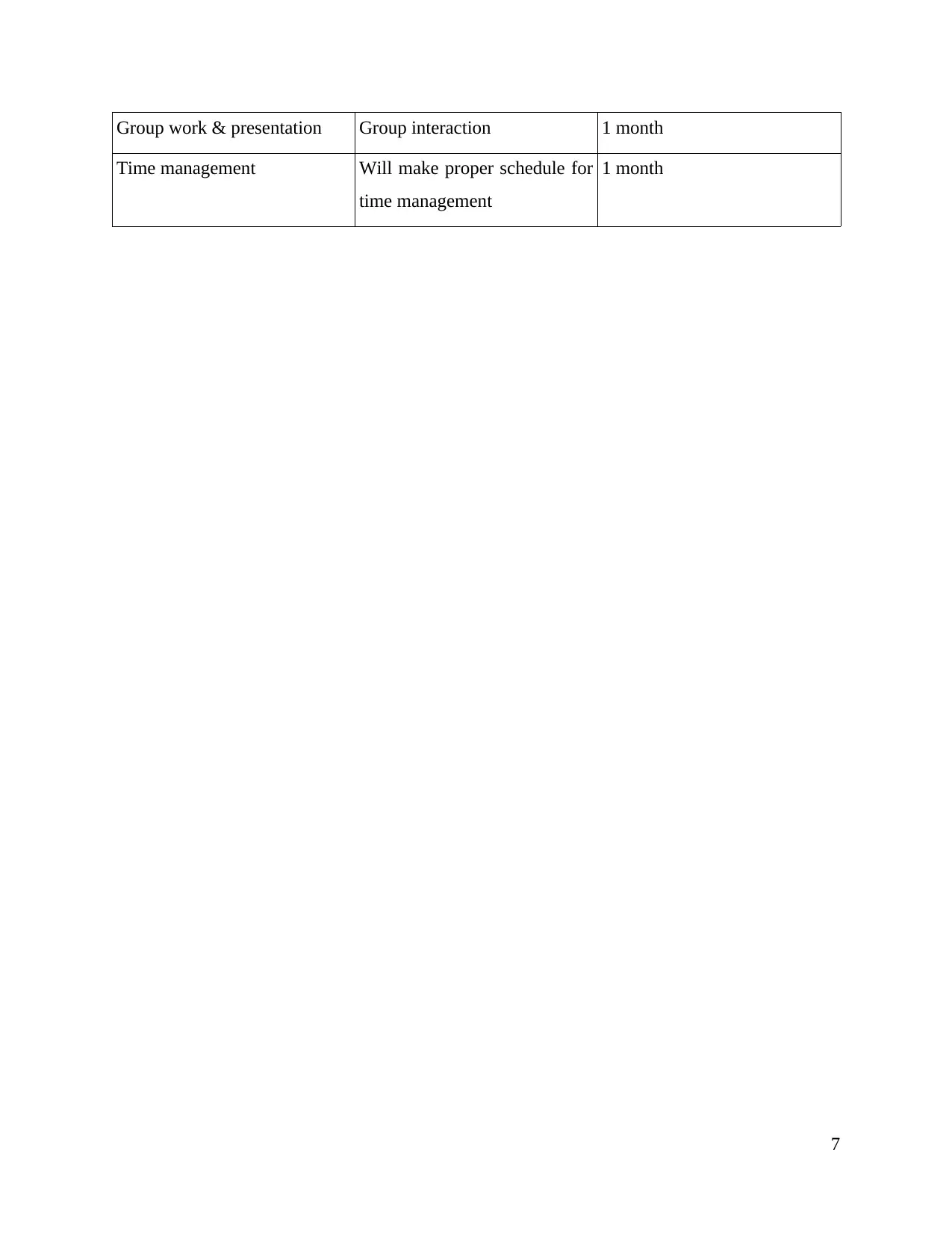
Group work & presentation Group interaction 1 month
Time management Will make proper schedule for
time management
1 month
7
Time management Will make proper schedule for
time management
1 month
7
⊘ This is a preview!⊘
Do you want full access?
Subscribe today to unlock all pages.

Trusted by 1+ million students worldwide
1 out of 9
Related Documents
Your All-in-One AI-Powered Toolkit for Academic Success.
+13062052269
info@desklib.com
Available 24*7 on WhatsApp / Email
![[object Object]](/_next/static/media/star-bottom.7253800d.svg)
Unlock your academic potential
Copyright © 2020–2026 A2Z Services. All Rights Reserved. Developed and managed by ZUCOL.



